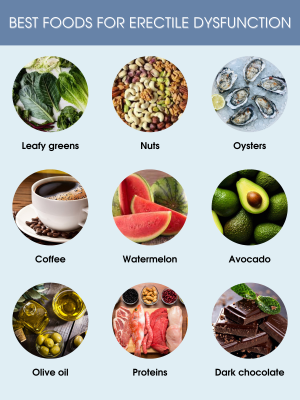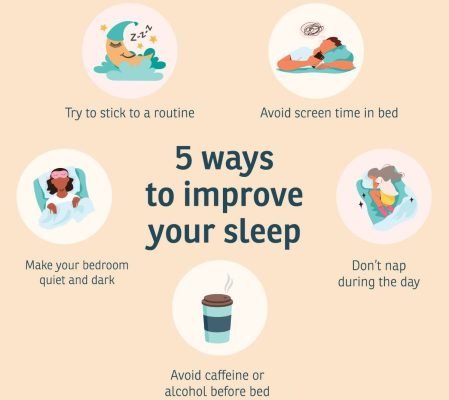Lifestyle Changes that Truly Help with ED
Erectile dysfunction (ED) is a common condition that affects millions of men worldwide. It can significantly impact quality of life, relationships and self-esteem. Fortunately, making certain lifestyle changes can help improve erectile function. In this article, we’ll explore key lifestyle adjustments, including dietary changes, exercise, stress management and more. Let’s dive in and discover practical ways to enhance your sexual health!
Understanding Erectile Dysfunction
Erectile dysfunction is defined as the inability to achieve or maintain an erection sufficient for satisfactory sexual performance. While occasional difficulties can happen to anyone, persistent ED may indicate underlying health issues that warrant attention. Understanding the nature of ED is essential, as it can stem from various factors, both physical and psychological.
Common Causes of ED
Several common causes contribute to erectile dysfunction:
- Cardiovascular problems, such as high blood pressure or atherosclerosis, can restrict blood flow to the penis, making it difficult to achieve an erection.
- Diabetes can lead to nerve damage and affect blood circulation, further complicating the issue.
- Hormonal imbalances, particularly low testosterone levels, can also play a role in sexual function.
- Psychological factors such as anxiety, depression and stress can interfere with sexual performance, creating a cycle that may worsen the condition.
By understanding these causes, you can take informed steps to address the root issues contributing to ED.
Want to understand erectile dysfunction better? Check out our blog article Getting Real About Erectile Dysfunction for honest insights and practical advice!
Key Lifestyle Changes
The thing is, with erectile dysfunction, the real health care is far more than taking an ED pill. You may be surprised to hear that, but almost every aspect of our lifestyle can contribute to treating ED successfully. Here are several lifestyle changes that can help improve your sexual health.
Eat a healthy diet
A balanced diet is foundational for overall health and can specifically aid in managing ED. Proper nutrition not only supports general wellness but also improves blood flow, hormone levels and energy levels. Emphasizing a diet rich in fruits and vegetables can provide essential vitamins and antioxidants that promote vascular health. For example, foods like berries and leafy greens are rich in flavonoids, which can improve circulation.
In addition to fruits and vegetables, including whole grains in your meals is crucial. Foods like brown rice and quinoa are not only nutritious but also help maintain stable blood sugar levels. Healthy fats, such as those found in fish, nuts and avocados, play a vital role in hormone production and overall heart health. Trans and saturated fats, on the other hand, contribute greatly to plaque buildup in your blood vessels and increase the risk of high cholesterol which can clog the tiny arteries of the penis.
Another good idea is to reduce the sugar intake. High blood sugar levels over a long period of time can damage the nerves and blood vessels which, again, will lead to problems with achieving and keeping an erection.
Supplements to Consider
In addition to a healthy diet, certain supplements may help improve erectile function. They can provide additional support for those who may not be getting enough nutrients through diet alone. Here’s the list of top supplements and natural remedies for erectile dysfunction:
- L-arginine: This amino acid may enhance blood flow by increasing nitric oxide levels. A typical dose ranges from 2 to 5 grams daily. Do not exceed it to avoid potential side effects.
- Ginseng: Known as “natural Viagra,” ginseng may improve erectile function by increasing the activity of nitric oxide – a molecule, really important for blood circulation.
- Zinc: An important mineral for testosterone production, zinc supplementation can be beneficial if levels are low. Aim for around 11 mg for men.
- Vitamin D: Research indicates that low levels of vitamin D are linked to erectile dysfunction. A supplement of 1,000 to 2,000 IU daily can help maintain adequate levels.
- Omega-3 Fatty Acids: Found in fish oil, these healthy fats promote heart health and improve circulation. A recommended dose is 1,000 mg of combined EPA and DHA daily.
- Vitamin C: Vitamin C is a powerful antioxidant that plays a crucial role in overall health, including vascular function. Some research suggests that vitamin C may improve blood flow by promoting the health of blood vessels and reducing oxidative stress. It also supports the production of nitric oxide. A typical dose is 1000mg daily.
- Vitamin E: Another antioxidant that helps protect cells from oxidative damage. Vitamin E can improve blood flow and enhance sexual function. It can also support hormonal balance, which can be beneficial for sexual health. A recommended dose is 200mg.
- Maca Root: Some studies suggest this Peruvian herb may enhance libido and improve erectile function as well as reduce stress and boost your energy levels.
- Yohimbe: Yohimbe is derived from the bark of the Pausinystalia yohimbe tree and has been traditionally used as an aphrodisiac. It contains yohimbine, an alkaloid that may increase blood flow and nerve impulses to the penis, potentially helping with erectile function. Some studies suggest it can enhance sexual arousal and performance, but results are mixed, and it can have side effects such as increased heart rate, anxiety, and high blood pressure.
Start working out
Physical activity plays a crucial role in maintaining a healthy body and can significantly benefit erectile function. Regular exercise is not just about weight management, it directly influences blood circulation, hormone levels and mental well-being. In fact, a Harvard study proved that even a 30-minute walk a day can reduce the risk of ED by 41%.
Engaging in aerobic exercise, such as brisk walking, running, cycling or swimming, can enhance cardiovascular health and increase blood flow throughout the body.
Furthermore, strength training can help boost testosterone levels, which are essential for sexual health. Focus on compound movements that engage multiple muscle groups, such as squats and deadlifts. Resistance exercises, whether through weights or body-weight movements, can be incorporated into your routine a few times a week. Pelvic floor exercises or Kegel exercises strengthen the pelvic floor muscles, which play a role in erectile function. These exercises involve tightening and relaxing the muscles used to control urination.
Manage your weight
Excess weight can contribute to erectile dysfunction, making weight management a key factor in improving sexual health. Maintaining a healthy weight is essential for overall health and can significantly improve erectile function. Obesity raises risk of cardiovascular disease, diabetes and hormonal imbalances – all of which can exacerbate ED.
Being overweight is the worst thing you can do to your penis. Men tend to accumulate fat in their lower abdomen and area at the base of the penis. Losing even a small amount of weight can lead to significant improvements in erectile function, as it may enhance blood flow and hormonal balance.
Reduce your stress
Stress and anxiety can have a profound effect on sexual performance. Managing stress is vital for improving erectile dysfunction. When the body is under stress, it releases hormones like cortisol, which can negatively impact libido and erectile function. Therefore, finding effective ways to cope with stress is essential.
Stress management is a personal choice but here are some techniques that might help you manage stress more effectively:
- Mindfulness: Practicing mindfulness or meditation can help reduce anxiety and improve focus. Even a few minutes of deep breathing can promote relaxation and mental clarity.
- Deep breathing exercises: These can lower stress levels and promote relaxation. Techniques like diaphragmatic breathing can calm the nervous system.
- Yoga: This practice combines physical activity with mindfulness and can help alleviate stress while improving flexibility and strength.
Finding effective ways to manage stress can lead to improvements in erectile function and overall mental well-being.
Limit Alcohol and Quit Smoking
Both excessive alcohol consumption and smoking can negatively affect erectile function. Making changes in these areas can be beneficial for your sexual health. Alcohol can depress the central nervous system, leading to reduced sexual arousal and performance. Too much alcohol can increase the desire, but it will absolutely decrease the performance. So, the best advice is to keep it moderate.
Smoking hardly needs a discussion. There have been multiple studies that have shown that smoking (passive smoking included) destroys Nitric Oxide and increases the risk of ED. Actually, men who smoke are twice as likely to develop ED as non-smokers. Smoking impairs blood circulation over the body, including the genital area, making it tougher to gain and maintain an erection.
Quitting will definitely have significant benefits for reversing ED. If you need help quitting, seek some support. Consider special programs or support groups. Counseling and nicotine replacement products (patches or gums) can increase your chances for success and make the transition easier.
Sleep Well
Quality sleep is essential for hormonal balance and overall health. Poor sleep can contribute to low testosterone levels, fatigue and increased stress, all of which can exacerbate erectile dysfunction. Establishing good sleep hygiene can help you achieve better quality sleep. Here are some things you can do:
- Establish a routine: Go to bed and wake up at the same time every day, even on weekends. Consistency helps regulate your body’s internal clock.
- Create a restful environment: Make your bedroom comfortable and free of distractions. Keep the room dark, quiet and cool to promote restful sleep.
- Limit screen time: Reduce exposure to screens before bedtime, as blue light can interfere with melatonin production and disrupt sleep patterns. So turn off your phone and TV at least one hour before the bedtime.
Aim for 7 to 9 hours of quality sleep each night to support overall health and well-being.
Do Check-Ups
Routine medical check-ups are essential for identifying underlying health issues that may contribute to ED. Regular visits to your doctor can help you stay informed about your health and detect any potential problems early.
Here are some key evaluations to consider during your check-ups:
- Blood tests: These can check for hormonal imbalances, such as testosterone levels, and assess for diabetes and cholesterol levels. Monitoring these factors is crucial for sexual health.
- Cardiovascular assessment: Evaluating heart health, including blood pressure and heart function, is essential. Since erectile dysfunction can be linked to cardiovascular issues, understanding your heart health is vital.
- Prostate exam: Screening for prostate health is important, as conditions like benign prostatic hyperplasia (BPH) can contribute to ED.
- Thyroid function tests: Assessing thyroid health can help identify imbalances that may affect sexual function.
- Mental health evaluation: Consider an assessment for anxiety or depression. Mental health plays a significant role in sexual performance and addressing these issues is key.
Regular check-ups can help you stay on top of your health and identify any issues early on, allowing for timely intervention and treatment.
Avoiding Common Mistakes in ED Treatment
While lifestyle changes can significantly improve erectile dysfunction, it’s equally important to avoid common mistakes associated with ED treatments. Many men may turn to medications without addressing underlying causes or may misunderstand how treatments work. For more insights on these pitfalls and how to navigate them effectively, be sure to check out our blog article on common mistakes with ED treatments.
Making lifestyle changes can significantly impact erectile dysfunction. Each step, from adopting a healthier diet to incorporating regular exercise and de-stressing, can lead to improvements in sexual health. Each small change contributes to a better overall life quality. Remember: dealing with ED, it is important to have a holistic approach to treatment. By taking proactive steps and prioritizing health, you can regain confidence and improve your quality of life.










